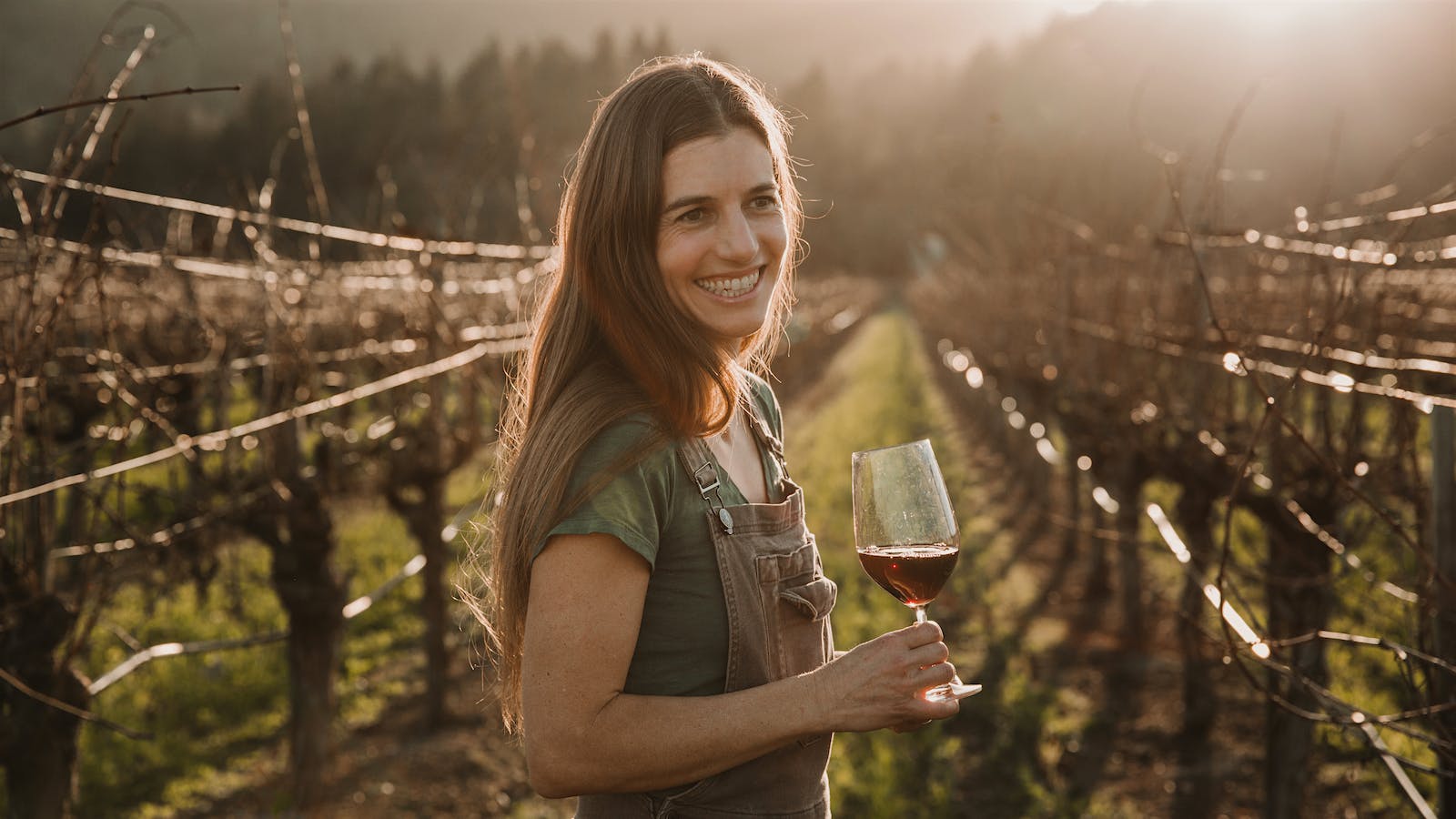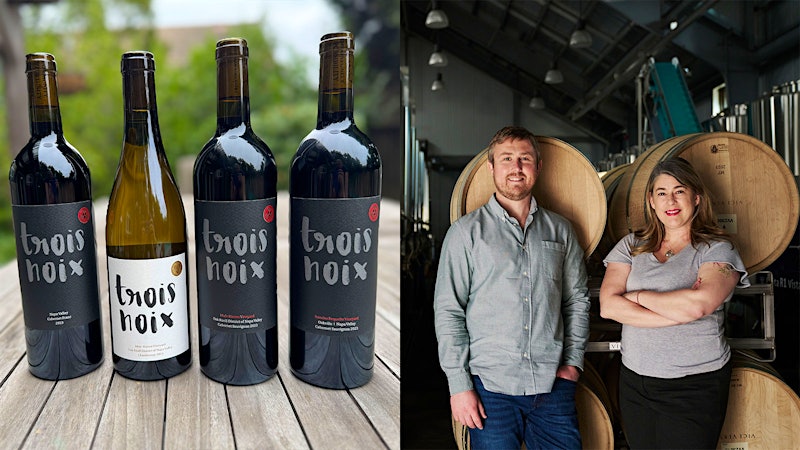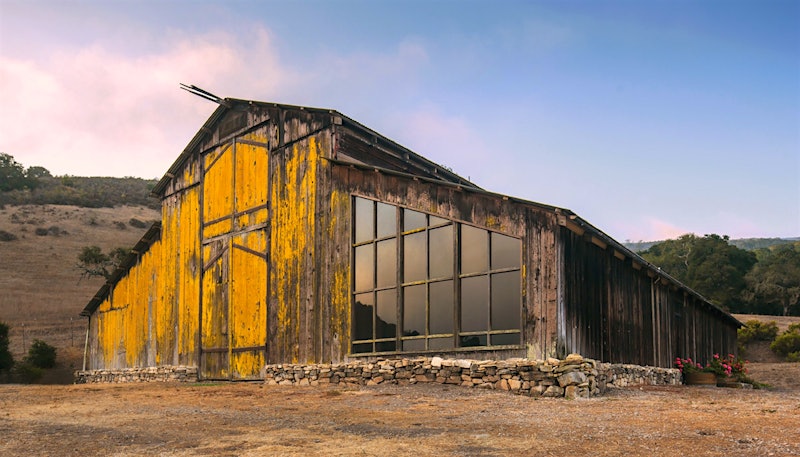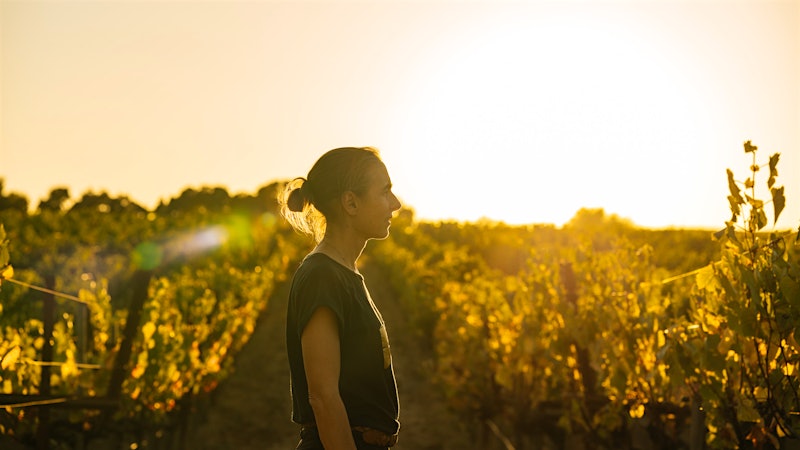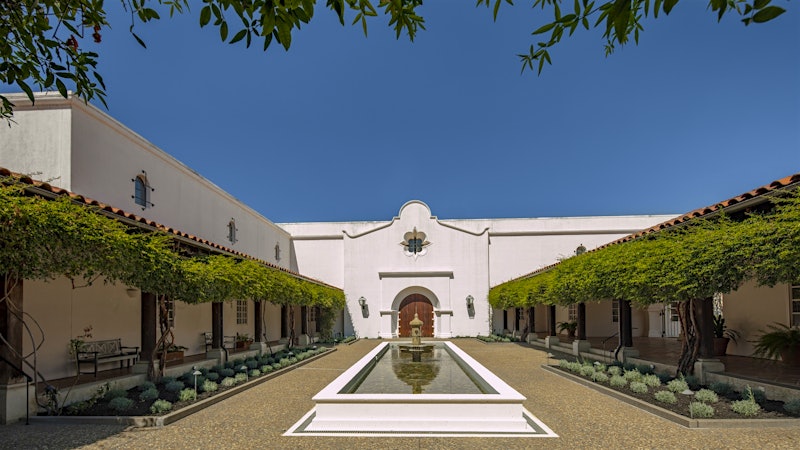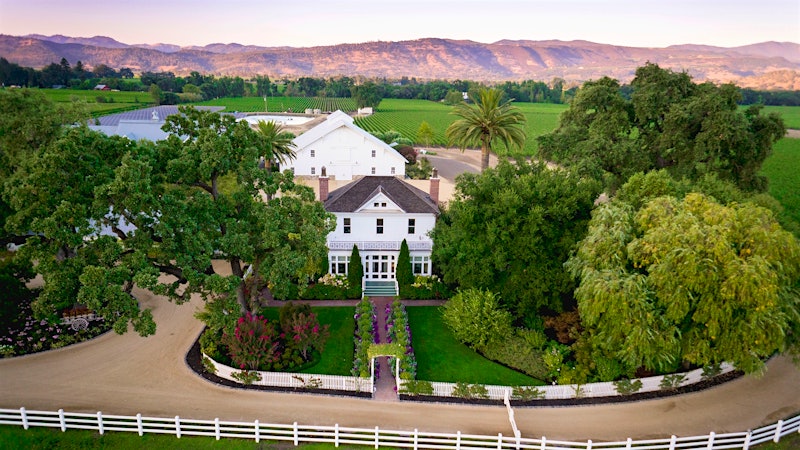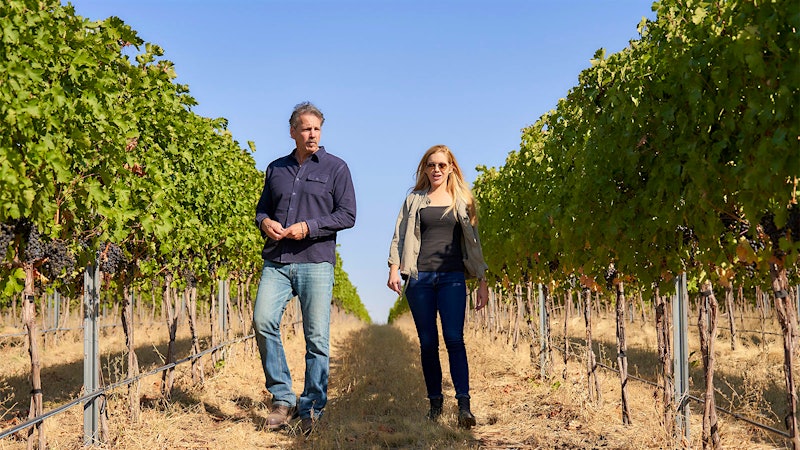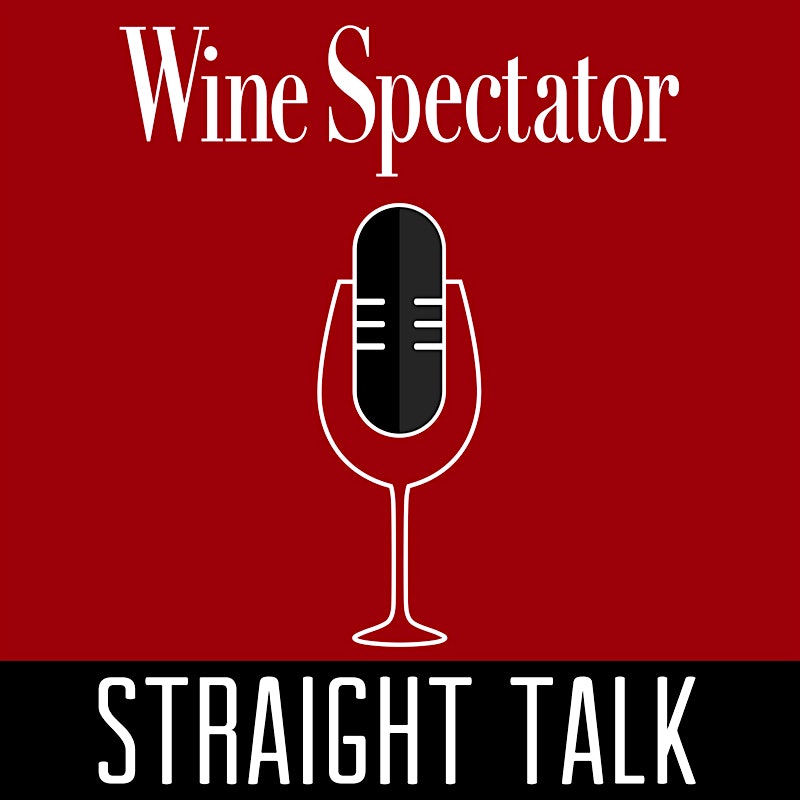Haley Wight strolls up a roughly paved road in the center of her family’s Lewelling Ranch in Napa Valley's St. Helena AVA. “My great-grandparents planted Carignane right here as soon as Prohibition ended,” she says, pointing to a section of vines now planted to Cabernet. “That’s why I was drawn to make that variety … I wish we still had those vines.”
Among Napa's many historic vineyards, Lewelling’s 160-year-old ranch flies under the radar. But it's one of the valley's oldest continuously owned family-farmed properties.
“There’s a lot of history in this little corner of St. Helena,” says Wight, the sixth generation of her family to farm the ranch, while pointing out celebrated nearby vineyards including Hayne and Dr. Crane.
Lewelling Vineyards may not have the same name recognition as some of its neighbors, but it does have an equally fascinating history. Wight’s great-great-great-grandfather, horticulturist John Lewelling, along with his brothers, was a West Coast fruit industry pioneer. He established Lewelling Ranch in 1864, planting vines and trees near the Mayacamas foothills in western St. Helena. And along with Charles Krug, Lewelling helped found the St. Helena Viticultural Club, and was a partner in owning a wine warehouse with Krug and the Beringer brothers.
Lewelling built a winery on Spring Street in St. Helena, but when phylloxera decimated his vineyards in the 1870s, he converted the land to walnuts and fruit trees and erected a dehydrator on the property, which remained in use through the early 1960s, processing walnuts from hundreds of local growers.
A vestige of the old processing area remains, as do numerous ancient fruit and nut trees, which Wight points out as we walk, arriving at the Gothic Revival–style home Lewelling built, which, today, is unfortunately in disrepair.
Fruit and nut crops remained the primary focus at the ranch until Wight’s great-grandparents planted the aforementioned Carignane vines. However, while there were grapes, nobody was making wine. In fact, much of the property was leased and farmed by others, including Frank “Laurie” Wood, the viticulturist behind Martha’s Vineyard, Bella Oaks, Grace Family and more.
It wasn’t until the 1970s when Wight’s father, Doug, and uncle, Dave Wight, came into the picture and transformed the property. Dave, a UC Davis graduate in viticulture and enology, worked at Inglenook for many years and founded the Lewelling family label in 1992.
Doug, a Cal Poly at San Luis Obispo graduate in fruit science, landed a job farming for Louis M. Martini Winery right out of college and convinced his family to replant what was then primarily walnut orchards in favor of Cabernet. Shortly thereafter, he established a vineyard management company, which continues to operate today, farming over 500 acres in the valley.

Today, Lewelling Ranch spans about 200 acres, including meadows where the family’s 10 head of cattle graze, natural habitat in the hills and 85 acres of vines planted on the valley floor. The Wights own 28 acres of vines, while their neighbors, the Taplins (also descendants of Lewelling), farm 26 acres, and 30 acres are jointly owned by the two families. Most of the grapes grown on the ranch are sold.
“We’re really farmers first,” says Wight, noting that her family’s old-school, salt-of-the-earth approach includes many longstanding relationships and contracts sealed over a handshake. Among those making Lewelling Vineyard–designated Cabernet include Jennifer Williams and Mark Porembski from Zeitgeist and Mike Smith at Myriad.
“My dad is due all the credit for us being relevant in Napa,” says Wight.
Past Meets Present at Lewelling Vineyards
While Haley Wight is the latest steward of the Lewelling land, including taking over winemaking duties from her uncle, it’s her own label, Hayfork, that brought me to the ranch.
The home Wight’s great-grandparents built in 1925 and that she grew up in is now surrounded by vines, but everything here has an antiquated feel, from the rustic wood floors to the dining table where Wight sets out a mini wine flight of new releases.
Growing up on the family ranch in quaint St. Helena, Wight couldn't wait to grow up and get out of town, a sentiment she now feels was naive. After high school, she earned a degree in earth science, then worked for the National Park Service in Washington while also doing seasonal work on farms in the Pacific Northwest.
“That’s kind of what called me back: realizing, I definitely got the farming gene,” Wight says with a glowing smile. Her formative years on the ranch had a lasting impact on her love of nature, and she’s proud to continue her family’s legacy as a farmer-owned property. A bumper sticker on her truck reads, “Know Your Farmer.”
Wight and her husband, Erik Dodd, began working seasonally for her dad’s vineyard management business before moving back home in 2004. Dodd took a full-time role under Wight’s dad, while she pivoted to the cellar.
She landed an intern gig at Terra Valentine on Spring Mountain and fell in love with the physical aspects of winemaking as well. During the early 2000s, the winery also served as a custom crush facility, and Wight recalls being surrounded by winemakers, including Mike Hirby, Brad Grimes and Andy Erickson. “Some fun folks to learn from, and lots of different wines being made,” she recalls, while also crediting her uncle, Dave, as a great winemaking mentor.

Hayfork’s first vintage was made at Terra Valentine in 2006: three barrels of her family’s Cabernet (which she pays full price for to this day). Wight says her dad, understanding the significance of owning one’s own business, encouraged her and Dodd to start Hayfork.
Their kids came first, though, limiting Hayfork to a few barrels each year. Once the kids started spending their days at school, Wight says she was ready to branch out, try new things and grow.
“I knew I wanted to make a white wine, but not another Sauvignon Blanc or Chardonnay,” she says, recalling 2014 as the year when she began to grow Hayfork. “Grenache Blanc grapes came my way because [Wight Vineyard Management] helps farm Kenefick Ranch.”
Wight also makes a 100 percent Marsanne from Kenefick. Both used to go into Kenefick’s Pickett Road White, before the winery downsized, opening the door for Wight to grow her brand. “People definitely don’t know what Marsanne is, but I like it!” she says with a laugh. (Hot tip: It's available by the glass at Charlie’s Napa Valley.)
For reds, there's a Hayfork Charbono from the Heitz Family Ranch vineyard and a Carignane from Mendocino, plus two Lewelling Vineyard Cabernets. Annual production for the Hayfork label tops out at around 1,000 cases.
Wight’s winemaking showcases purity and freshness, employing primarily neutral oak and some stainless drums for the whites, which are expressive and refreshing. I also tasted the Carignane, which is bright, with spicy floral notes and juicy red fruit flavors.
“My uncle used to say Carignane was in everything at Inglenook, and spoke of it as a workhorse grape,” Wight says, adding, “So, I think of it, and Charbono, as heritage Napa Valley grapes. And that’s why I started making those two varieties. There was no business plan; it’s kind of the nostalgia, really, and to honor my great-grandparents.”
Wight says she looked all over Napa Valley for Carignane vines, but eventually made a kindred connection with the Johnson family, nearly 100 miles north in Mendocino’s Redwood Valley. The Johnson family’s fifth generation is now tending the family’s head-pruned vines, many of which date to the 1950s.
Since taking over winemaking at Lewelling, Wight says she more or less follows her uncle’s protocols, citing consistency as one of his greatest strengths in winemaking, and a trait that the family shares when it comes to farming. “We don’t do change. We don’t take a lot of risks,” admits Wight. “But we’re still here.”
Meanwhile, the Hayfork lineup offers Wight freedom to do what she likes, stylistically.
As for the future, the seventh generation has already spent plenty of time kicking Lewelling Ranch dirt. “We’ve put them to work in the field, but not for too long; we don’t want them to hate it!” jests Wight of her two teenagers. “But they’re as connected to the land as I am.”
While Hayfork offers Wight an opportunity to express her creativity, keeping her attention on the family ranch remains paramount. “This land should be preserved for future generations. That’s the one thing everyone agrees on. There are a lot of challenges as things evolve in Napa County, and generations get more complicated. But my contribution to this family in my lifetime is succession planning and stewardship.”
Visit the Lewelling Vineyards and Hayfork Winery Tasting Room
1282 Vidovich Ave., St. Helena, Calif.
Tastings Fridays and by appointment
Telephone: (707) 963-1685
Website: https://www.hayforkwine.com/
Read all of our Winery Intels, follow senior editor Aaron Romano on Instagram at @aaron_romano_wine, and never miss an update with Wine Spectator's free email newsletters.


